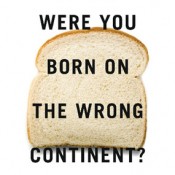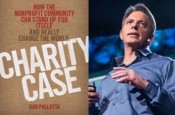Q&A: THOMAS GEOGHEGAN, Author
Written on January 28th, 2015 |
Q&A: DAN PALLOTTA, CHARITY CASE: How the Non-Profit Community Can Stand Up for Itself and Really Change the World
Written on August 15th, 2014 |
Aired: 04/15/13
When someone approaches you to donate to a non-profit, how many of you want to know how much of of its money goes to salaries and fund-raising and how much goes to actual program services? If you’re like most people, that question probably figures into your decision.
I myself have factored that question of how much is spent on overhead into my charitable giving. But is it a valid or wise way to make such decisions? According to today’s guest, DAN PALLOTTA, while it may be helpful, much more important is how well they serve their mission, how good a job they’re doing solving the problems you care about.
In his earlier book, UNCHARITABLE, Pallotta, who has a record of helping to raise hundreds of millions of dollars for causes, made the case that the way we think about non-profits and the rules we set for them, makes it harder for them to succeed on a truly significant scale. Too many nonprofits, he says, are rewarded for how little they spend — not for what they get done. Instead of equating frugality with morality, he asks us to start rewarding charities for big goals and big accomplishments (even if that comes with big expenses). Where other folks suggest ways to optimize performance inside the existing paradigm, UNCHARITABLE suggests that the paradigm itself is the problem and calls into question our fundamental beliefs about charity.
With a new book, CHARITY CASE: How the Non-Profit community Can Stand Up for Itself and Really Change the World and in a recent very popular TED talk, he says “My goal … is to fundamentally transform the way the public thinks about charity within 10 years.”
www.danpallotta.com
www.advertisingforhumanity.com
Q&A: Marshall Ganz-Power of Story in Social Movements
Written on July 23rd, 2014 |
Aired 03/04/12
In the early 1960s, MARSHALL GANZ dropped out of Harvard to join the Civil Rights Movement in Mississippi. He then spent 16 years working with César Chávez and the United Farm Workers. He returned to Harvard in the 1990’s, graduated, earned his Ph.D., and now teaches organizing and the power of public narrative at the Kennedy School.
During Barack Obama’s 2008 presidential campaign, he was lead organizer of the grassroots for the former community organizer. GANZ offers a valuable perspective on the Occupy/99% movement.
Free Forum Q&A: TERRENCE McNALLY Turning the tables, my turn to answer Qs interviewed by Sara Davidson
Written on February 4th, 2014 |
Aired: 2/2/14
I am going to take a hiatus from this show in a few weeks, for the first time in 17 years. I need to focus on some other projects, including a book I’m writing, and won’t be able to afford the time to produce and host this show probono.
In anticipation of this upcoming break, I will be the guest this week and SARA DAVIDSON, best-selling author of Loose Change and Leap, whose new book, The December Project will come out in March, will be interviewing me. I’ve long thought it is only fair that I have to answer a few questions and this week it’s going to happen.
Q&A: RICHARD DAVIDSON, DAVID EAGLEMAN, and PETER BAUMANN
Written on March 15th, 2012
 |
Aired 03/11/12
RICHARD DAVIDSON, author,
The Emotional Life of Your Brain
DAVID EAGLEMAN, author,
Incognito: The Secret Lives of the Brain
PETER BAUMANN, convener,
BEING HUMAN 2012
In 1989 I addressed the 20th reunion of my Harvard class. In 1969, we’d spearheaded student protests that led to a month long strike of the University. Our demands included removing ROTC from campus, creation of an African-American studies program, and reforming Harvard’s behavior as a landlord. Twenty years later, I encouraged my classmates to live up to our youthful ideals. I recall focusing on environmental challenges, including the mounting evidence of man-made contributions to climate change. But when asked where we needed to focus our attention to turn things around, I pointed to the environment within our own minds.
Now, over twenty years later, my conversations about politics, economics, technology, ecology, etc. focus more and more on the need to tinker with the human software that drives or interprets everything we do. As we use the tools of science to explore the nature of humanity, we are learning more and more about how our brains function and what motivates our behavior, built-in biases and blind spots. I find myself paying a lot of attention to the fields of behavioral economics, cognitive neuroscience, evolutionary psychology, social anthropology, philosophy – that promise to overthrow long-held biases and stories about what it means to be human.
http://thebaumannfoundation.org
